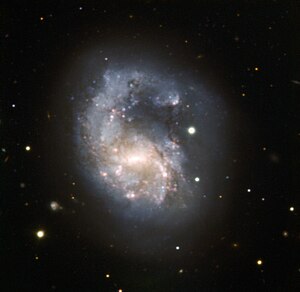NGC 4027
Appearance
(Redirected from UGCA 260)
| NGC 4027 | |
|---|---|
 ESO image of NGC 4027 (mirrored). | |
| Observation data (J2000 epoch) | |
| Constellation | Corvus |
| Right ascension | 11h 59m 30.2s[1] |
| Declination | −19° 15′ 55″[1] |
| Redshift | 1671 ± 6 km/s[1] |
| Distance | 83 Mly (25.6 Mpc)[2] |
| Apparent magnitude (V) | 11.7[1] |
| Characteristics | |
| Type | SB(s)dm[1] |
| Apparent size (V) | 3'.2 × 2'.4[1] |
| Other designations | |
| UGCA 260, PGC 37773, Arp 22, VV 066, VIII Zw 158[1] | |
NGC 4027 (also known as Arp 22) is a barred spiral galaxy approximately 83 million light-years away[2] in the constellation Corvus. It is also a peculiar galaxy because one of its spiral arms goes out more than the other. This is probably due to a galactic collision in NGC 4027's past.
One supernova has been observed in NGC 4027: SN 1996W (type II, mag. 16).[3]

Galaxy group information
[edit]NGC 4027 is part of the NGC 4038 Group, a group of galaxies that also contains the Antennae Galaxies (NGC 4038/NGC 4039).[4][5][6][7]
See also
[edit]- NGC 4618 - a similar one-armed spiral galaxy
- NGC 4625 - a similar one-armed spiral galaxy
- NGC 5713 - a similar one-armed spiral galaxy
References
[edit]- ^ a b c d e f g "NASA/IPAC Extragalactic Database". Results for NGC 4027. Retrieved 2006-10-31.
- ^ a b "Distance Results for NGC 4027". NASA/IPAC Extragalactic Database. Retrieved 2010-05-16.
- ^ Transient Name Server entry for SN 1996W. Retrieved 30 March 2023.
- ^ R. B. Tully (1988). Nearby Galaxies Catalog. Cambridge: Cambridge University Press. ISBN 978-0-521-35299-4.
- ^ P. Fouque; E. Gourgoulhon; P. Chamaraux; G. Paturel (1992). "Groups of galaxies within 80 Mpc. II - The catalogue of groups and group members". Astronomy and Astrophysics Supplement. 93: 211–233. Bibcode:1992A&AS...93..211F.
- ^ A. Garcia (1993). "General study of group membership. II - Determination of nearby groups". Astronomy and Astrophysics Supplement. 100: 47–90. Bibcode:1993A&AS..100...47G.
- ^ G. Giuricin; C. Marinoni; L. Ceriani; A. Pisani (2000). "Nearby Optical Galaxies: Selection of the Sample and Identification of Groups". Astrophysical Journal. 543 (1): 178–194. arXiv:astro-ph/0001140. Bibcode:2000ApJ...543..178G. doi:10.1086/317070. S2CID 9618325.
External links
[edit]Wikimedia Commons has media related to NGC 4027.
- NGC 4027
- The spiral galaxy NGC 4027
- NGC 4027 on WikiSky: DSS2, SDSS, GALEX, IRAS, Hydrogen α, X-Ray, Astrophoto, Sky Map, Articles and images
